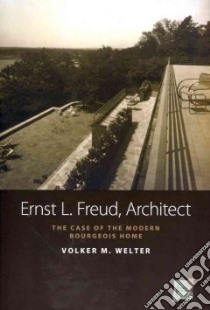Ernst L. Freud, Architect: - 9780857452337
Un libro in lingua di Welter Volker M. edito da Berghahn Books, 2011
- € 33.20
- Il prezzo è variabile in funzione del cambio della valuta d’origine
Ernst L. Freud (1892–1970) was a son of Sigmund Freud and the father of painter Lucian Freud and the late Sir Clement Freud, politician and broadcaster. After his studies in Munich and Vienna, where he and his friend Richard Neutra attended Adolf Loos's private Bauschule, Freud practiced in Berlin and, after 1933, in London. Even though his work focused on domestic architecture and interiors,Freud was possibly the first architect to design psychoanalytical consulting rooms—including the customary couches—a subject dealt with here for the first time. By interweaving an account of Freud's professional and personal life in Vienna, Berlin, and London with a critical discussion of selected examples of his domestic architecture, interior designs, and psychoanalytic consulting rooms, the author offers a rich tapestry of Ernst L. Freud's world. His clients constituted a “Who's Who” of the Jewish and non-Jewish bourgeoisie in 1920s Berlin and later in London, among them, the S. Fischer publisher family, Melanie Klein, Ernest Jones, the Spenders, and Julian Huxley. While moving within a social class known for its cultural and avant-garde activities, Freud refrained from spatial, formal, or technological experiments. Instead, he focused on creating modern homes for his bourgeois clients.
"...[I]nnovative and very rich in new perspectives on European domestic architecture after WWI. As well as revealing the life and work of a little known architect with a famous family name, it discusses major theoretical questions of an overlooked aspect in twentieth-century architecture: the bourgeois home (contrary to social mass-housing)." - Edina Meyer-Maril, Tel Aviv University
"The book is an important contribution to the history of architecture—by raising awareness of this one fascinating architect, whose work is curiously minimized in the scholarship on modern architecture, Welter not only makes significant contributions to the roster, he also advances the ongoing reassessment of architectural modernism (as a style) and modernity (as a phenomenon)." - Karen Koehler, Hampshire College
Informazioni bibliografiche
- Titolo del Libro in lingua: Ernst L. Freud, Architect:
- Sottotitolo: The Case of the Modern Bourgois Home
- Lingua: English
- Autore: Welter Volker M.
- Editore: Berghahn Books
- Collana: Berghahn Books (Hardcover)
- Data di Pubblicazione: 15 Novembre '11
- Genere: Lingua Inglese
- Argomenti : Architecture, Domestic Europe History 20th century
- Pagine: 214
- ISBN-10: 0857452339
- EAN-13: 9780857452337


